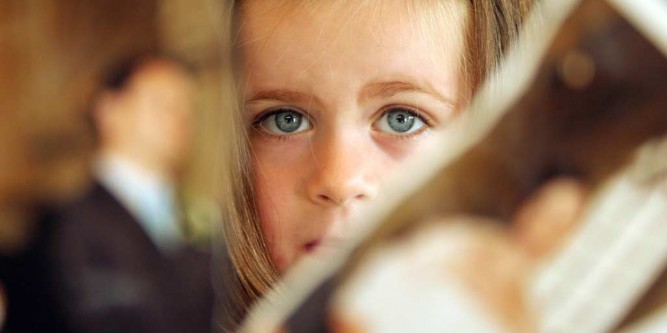We’ve all experienced the pain of heartbreak. It hurts. A lot.
Children experience heartbreak, too. Jenny Funderburke reminds us that there is a hurting child in our ministry right now. She shares five simple ways to minister to the brokenhearted.
There is a hurting child in your world.
You may know he’s hurting, you may not. He might be in your neighborhood. He might be in the children’s ministry class you lead. He might be on your son’s baseball team. He might be your son’s best friend or he might be the kid who drives your child crazy. He might live next door. He might live in your home.
She may act like she’s hurting, she may not. She may have big, sad eyes. She may be bouncing off the walls and seeking lots of attention. She may not say a word or she may have more words than you really want to hear. She may be the one who is trying to follow every rule and be the perfect child. Or she may not.
It could be a million things that cause the hurt. This is a broken world and there are too many things that break little hearts. Divorce. Abuse. Secret family struggles. Poverty. Difficulty in school. Mean friends. Special needs. Pain of feeling different.
Wherever he is in your world, he is present. However her hurt manifests, it is there. Whatever has caused it, the pain is real. And the question for you, grown up… is what do you do with that?
Because there is, without a doubt, a hurting child in your world.
You could pretend that hurt isn’t there. After all, you cannot fix all problems and you can’t certainly fix a child’s hurting heart. And is it really our business anyway? You certainly wouldn’t want to cause any awkwardness for the child… or for you. Surely the child has other people in his or her life who can help. You could just pretend the hurt isn’t there.
OR NOT. OR you could choose to be a hero to the hurting child.
Not the kind that swoops in with a cape to save the day. You can’t heal marriages or beat up the playground bully or resolve a family’s financial crisis. And the truth is, kids are more realistic than we are. They don’t expect that. That is not what they need.
But you can be a hero in simple ways that may seem insignificant to you. Here are five seemingly insignificant things you can do that really do make a difference in the heart of a hurting child.
- Smile. Seriously. There are not words that express what what a kind smile can do in the heart of a sad child (or grown up for that matter). You don’t have to be creepy or over the top. Just kind.
- Be present. What this looks like will vary based on your relationship with the child. If you know the child well, it may involve making an effort to go to ball games or to sit by them at church or to engage them in conversation about their favorite video game. If the child is just an acquaintance, it may mean intentionally saying hello when you see him or sitting by her when she’s sitting alone on the playground.
- Show much grace with definite boundaries. Hurting kids display their hurt in a variety of ways. Some may be loud or unruly. Show grace and love no matter what. Remember that there is always a reason behind the actions. At the same time, though, kids who are hurting still want and need to know that there are boundaries. Boundaries make them feel safe, even if they are constantly pushing against them. Just because a child is hurting doesn’t give them permission to commit murder. Hold boundaries, lovingly correct, and show much grace.
- Kind words. Lots of times, hurting kids are surrounded by adults who are hurting too and likely in survival mode. Especially for older kids, kind and encouraging words may not be a priority in their home. Look for opportunities to speak love to hurting kids. Be genuine. Proverbs 18:21 says “Death and life are in the power of the tongue.” What if, just what if, you were the only grown up who intentionally spoke life to a hurting child? Seriously? The only one?!
- Be safe. Be a person that is consistent and caring in the life of the child, whatever that looks like. The hurting child may never open up to you about the hurts he is experiencing, but he might. A child might never choose to turn to you because she needs help, but she could. Even if that never happens, a hurting child will greatly benefit from knowing that he or she has church leaders, neighbors, friends, etc… who are in her corner.
Who is the hurting child in your world? What can God do through you today to show His love and care to that broken heart?
Article used with permission. Jenny Funderburke.






